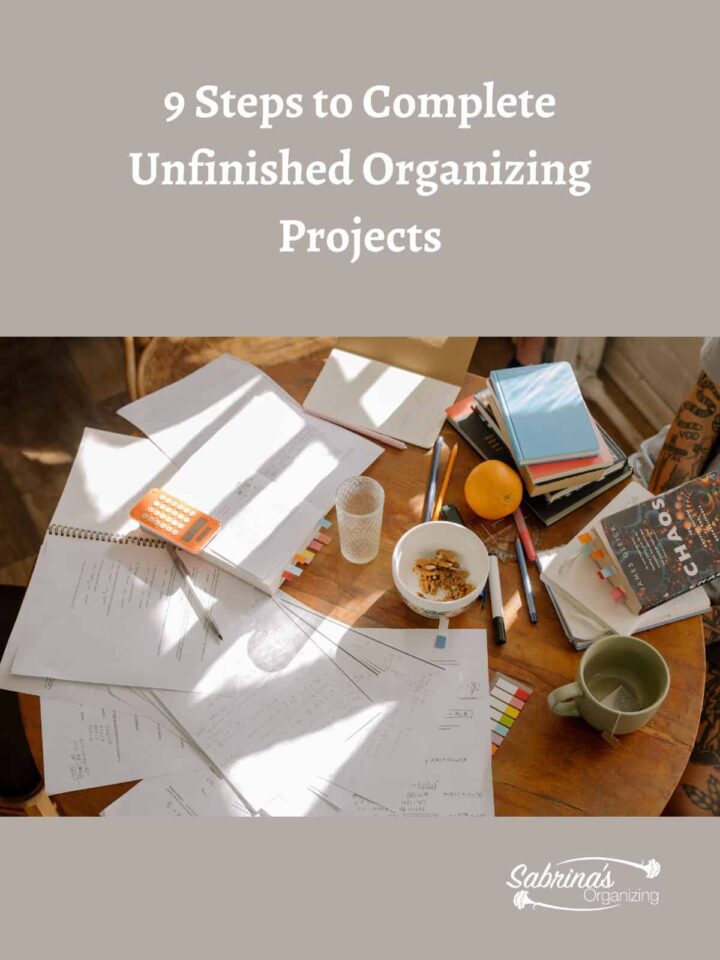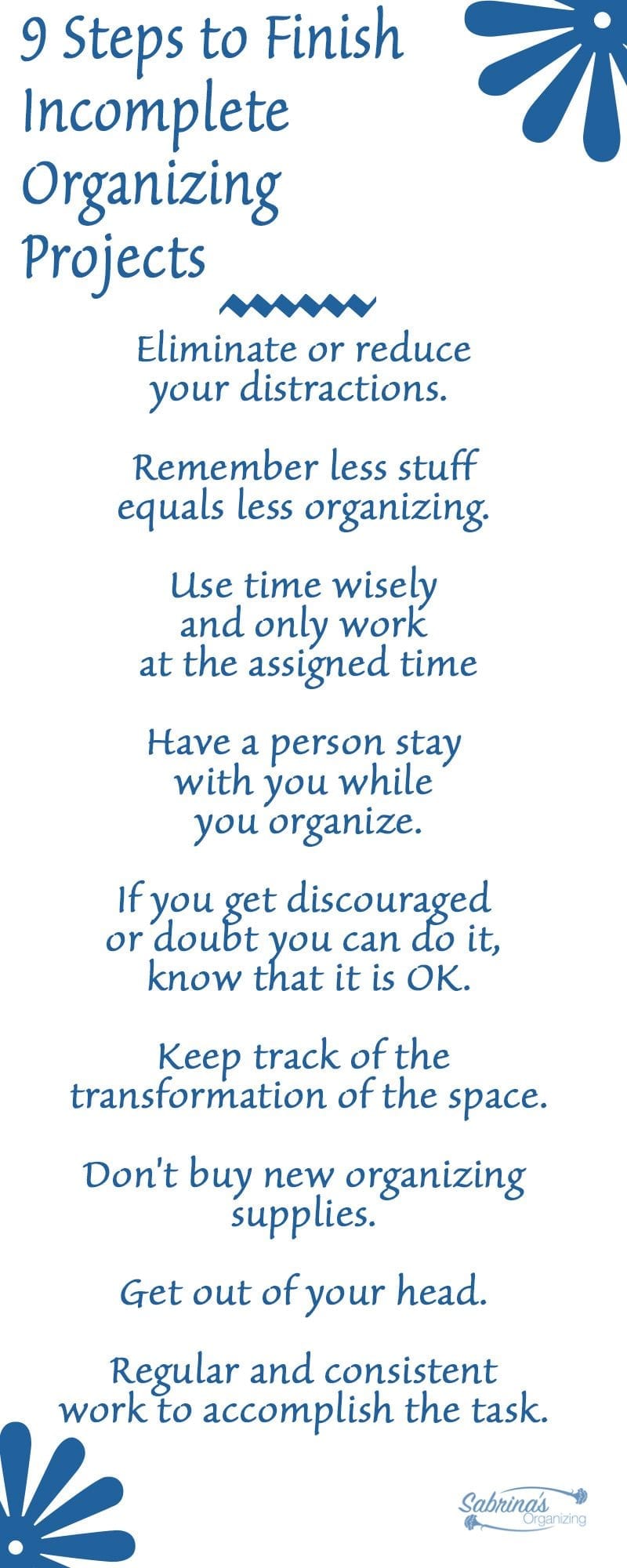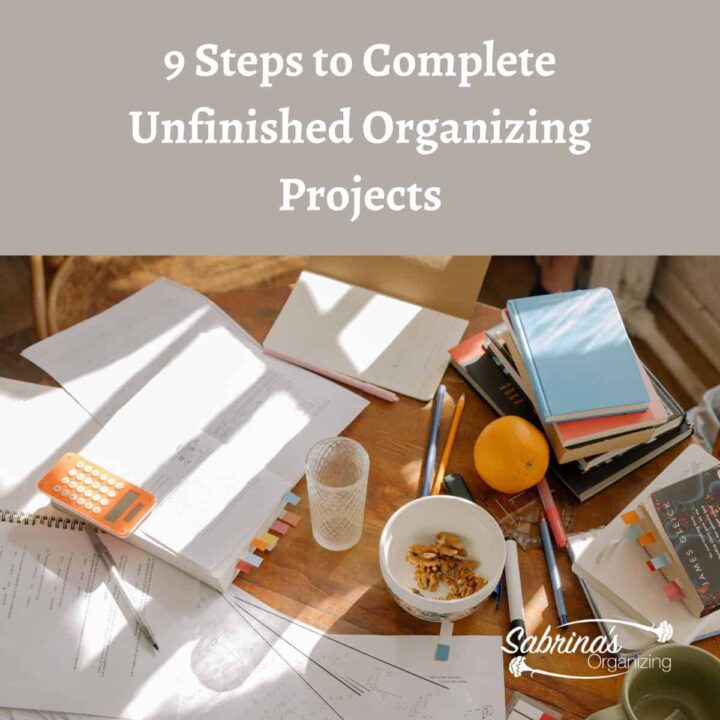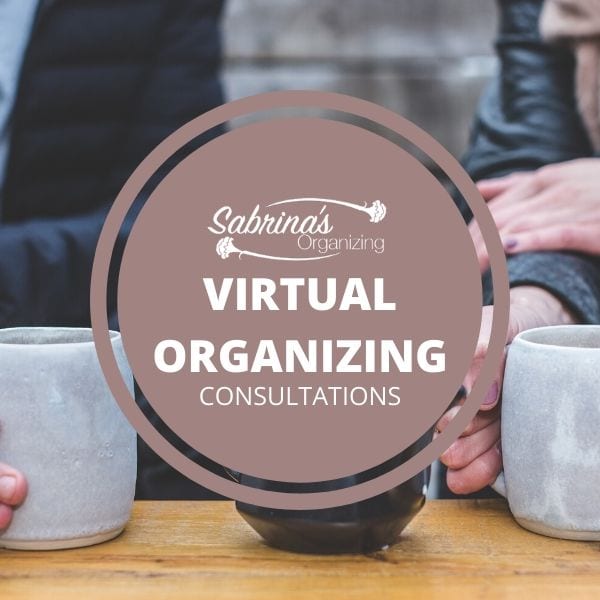****Visit our "Disclosure Policy and Cookies" for details. Affiliate links appear on this page from Google Adsense, Amazon, Order Out of Chaos, Impact affiliate members, Release, Repurpose, Reorganize, and Shareasale affiliate members.****
Organizing Projects can easily be stopped and never returned to finish. Since the organizing process has many layers and details, it's no wonder why so many people stop before finishing their organizing project. It's not all about purging or organizing. Many steps can easily stop you from completing your old projects. Distractions are just one of the factors that can cause unfinished organizing projects. Frustration about what to do next is another.
Picture this: when you start decluttering your kitchen drawer, you will find several used and unused batteries mixed together in one area. Knowing you must test them all to find the ones that work, you stop and look at the clock and realize this will take a lot of time. So you stop, toss everything pulled out back in the drawer, and move on to something else. Never go back to that area because the batteries need revisiting.
Before starting a new project. Let's finish up some other organizing projects by trying these nine steps, which will bring you back into focus and take you forward to completing those unfinished projects. Are you ready to complete those unfinished organizing projects you stopped putting off? Try these steps and watch how they will give you the strength to finish. Let's begin.
Jump to:
- Where to start?
- What are incomplete organizing projects?
- Where do I find my incomplete organizing projects?
- Project pieces you will need to start completing these organizing projects
- Eliminate or reduce your distractions.
- Remember, less stuff equals less organizing.
- Use time wisely and only work at the assigned time.
- Have a person stay with you while you organize.
- If you get discouraged or doubt you can do it, know it is OK.
- Keep track of the transformation of the space.
- Don't buy new organizing supplies.
- Get out of your head.
- Regular and consistent work to accomplish the task.

Where to start?
The first thing you need to do is figure out what particular project will improve your overall life. The highest priority incomplete organizing project helps you and your family save time and money and improve your lifestyle - resulting in less stress and a happier home.
What are incomplete organizing projects?
Visit your home and take an honest look at your incomplete organizing projects. These projects include clearing out the entryway clutter and kitchen cabinet, decluttering the pantry (Affiliate Link), making room in a closet, decluttering the garage (Affiliate Link), organizing photo albums and baby albums, attic or basement, and removing unwanted coats and shoes (Affiliate Link). Basically, any decluttering or reorganizing projects you left lying around. No judgment here; we all have these projects looming in our homes. I've seen several incomplete organizing projects while organizing an entire house with clients. They are everywhere.
Where do I find my incomplete organizing projects?
Some areas where you may find incomplete organizing projects are the home office, bedroom, bathroom, kitchen, living room, sewing room or craft room, dining room, basement, garage (Affiliate Link), and living room/ family room. These projects may be lying on surfaces, bookshelves (Affiliate Link), fireplace mantels, shoved into closets, storage units, storage chests, or desks in these rooms.
Project pieces you will need to start completing these organizing projects
There are various things you can use to help you speed up the completion of these unfinished organizing projects. Below are just some of the things that will help you.
- Trash bag - as many as you need. Large bags work best.
- Recycling bag or bin - great for removing papers and other recycled items.
- Jumbo marker, removable tape, and paper—this helps when an item is too large to fit in a trash bag or recycling bin (Affiliate Link). Write down the next to-do task with the item on the piece of paper and tape it to the item to remind you.
- Storage bins - include a variety of sizes to help you sort the items you want but don't need to be left out.
How to complete your incomplete organizing projects
Now, let's share the best way to get you back to organizing these areas of your home. There are nine below and some may work more than others. Try them all and see which one gets you to the finish line.
Eliminate or reduce your distractions.
Turn off the TV, your smartphone, and your computer (Affiliate Link). Stay focused on working with only one item at a time. If you need some noise while doing your organizing project, try classical music (Beethoven), Jazz, or any music without words instead. I created a few Spotify Playlists for decluttering your kitchen and paper decluttering. Feel free to visit the post. Reduce your mental clutter. This tip helps minimize distractions and increase your focus.
Remember, less stuff equals less organizing.
When working through your stuff, if you feel you are keeping too much, remind yourself that less stuff will give you the freedom you desire. After all, why are you decluttering if you don't want more freedom from your stuff?
Free Shipping and Free 60 Days Returns
Use time wisely and only work at the assigned time.
Add appointments to your calendar that state what you want to purge or organize for that particular time. Accurately determining the timeslot with the tasks you want to accomplish will allow you to stay on target. If the work takes several days, split the tasks into several 1-2 hour time slots. Give details on what you must do for each appointment (for the next week). Use an alarm on your calendar to ensure you do not forget what needs to be done and stop when your time is up. Going over on time will make you feel exhausted and more likely to get overwhelmed. Pace yourself, and you will reduce stress and eliminate clutter.
Have a person stay with you while you organize.
Hire a professional organizer or a decluttering buddy in your area, and ask them to spend time with you while you go through the process. Make sure it is a person who has decluttered before. You don't want someone who doesn't often declutter because they may guilt you into keeping stuff you don't want or need. Just the fact a person is there with you will make your time more productive because you don't want to feel like you are wasting their time as well.
If you get discouraged or doubt you can do it, know it is OK.
We all get discouraged. If you get overwhelmed, take a step back and revisit the process you have already completed. Take a deep breath and keep moving forward. Write down what you are struggling with, and then move on to something else.
Keep track of the transformation of the space.
Take before photos of the space. Don't look at them. Just take them. After each work session, take another picture. Then, look at the before picture and then the after picture. Examine how it makes you feel. Do you love what you did? Is there any regret? Are there any words that come up through the process? Write it down. Take another before and after picture the next time you work on the space. Do this process every time you finish organizing to motivate you to move forward the next time. This will help you see objectively what you have done and how you have reduced your clutter. It's an eye-opener.
Don't buy new organizing supplies.
Organizing supplies should only be purchased if you don't have an item to use for your organizing project. Look around your home first and see if other items can be used in this area. Spending money you don't have may prevent you from finishing the project, so take this thought off the table.
Get out of your head.
Another thing you can do to get your unfinished organizing projects complete is to get out of your head. We tend to have memories of all the items in our home, especially the items from trips, life events, and childhood. The key (Affiliate Link) (Affiliate Link) to these items is to determine the cause of the attachment. Ask yourself these questions:
- Is it that you love the piece?
- Does the article represent something you lost or value?
- Does it bring sad memories when you look at it?
- When you look at it, does it bring back memories of happiness?
All these memories will stop you from letting go of an item. So, instead, determine what you want to do if you feel like you are thinking too much about a particular item and can't get rid of it. An option would be to take a picture of the object. You can decide I don't want to remember this and let the item go. You can also keep the item and repurpose it in another area. However, the key (Affiliate Link) is to use the item, not just move it from one area to another.
Regular and consistent work to accomplish the task.
When we don't work on a project for a while, we tend to forget the reason we are doing the organizing project. So, to keep us focused and not distracted, doing the project consistently will keep you from stalling. Regular weekly set time to do things will make you feel more accomplished. If something comes up and you need to change the time or day, create a reminder in your calendar for future activity. Include what you need to get done at the next time slot and allocate as much time as you think you will need.

These steps can be used to combat the procrastination that happens when you get frustrated or overwhelmed in an organizing project. Not all the steps have to be used at once. You can pick and choose the order you try. There's no particular order required. Whichever order of these steps you wish to use is your prerogative.
Completing these unfinished organizing projects will transform your space from a disorganized one to an organized, well-functioning one. Let's continue the conversation. How do you get yourself back on track when you get frustrated in an organizing process?
Please contact me through my Virtual Organizing service page. I would love to help you overcome your obstacle in your unfinished organizing projects.
If you click through on the above links and buy something on Amazon, I will receive a small referral commission. Happy shopping!
Feel free to check out our other posts about changing habits.














Julie Bestry
Such good advice. You know that I'm a big believer in having an accountability buddy, and that works great for finishing decluttering-related projects unless, as you note, that person has the ability to body double and keep you on track (like a professional organizer) and not try to wheedle you into keeping things you don't need because they, themselves, aren't skilled at letting go.
I also think the four questions you apply to things are essential to feeling confident about what you let go of so you don't guilt-trip and second-guess yourself later (which makes letting go of other things so much harder).
Diane N Quintana
These are terrific tips, Sabrina.
I love that you advise someone not to work with a person who doesn't declutter very often. I agree, people like that will guilt you into keeping things you're ready to release. I also like your suggestion for setting a regular work time. Keeping things consistent helps to move the project along. Also, you can anticipate that this is the time to work on this task.
Janet Barclay
To find incomplete organizing projects, I should probably look into the bags and boxes in my office closet. Some I know are keepers, but others were tucked away to deal with later. Even some things I thought were keepers are in bags - if that was the case, why wouldn't I have put them in a labelled box or other more permanent home? Thanks for giving me a starting point!
Seana Turner
I love that you encourage people to stick to working only for the time they have allotted to organize. We can think we should push through to finishing the project, but it is wiser to stop. That way, we know that next time, we can trust the amount of time we have allocated, and not fear that we'll go down a rabbit hole and end up being overwhelmed.
Linda Samuels
It's not uncommon to leave the last 10-20% of a project incomplete. Your strategies for returning to the project with the intent of completion are great.
It is beneficial to reestablish the why, get support, and set realistic time boundaries for working on things. Often, the dread of the time needed to complete something can discourage you from starting. But if you put a limit at the start to only work in shorter time blocks, that can be enough to get you going. And you know how it goes: Once you start, it's easier to activate again.
The key is making the experience as positive as possible. Having music, getting support, and creating a comfortable editing/organizing environment can help things go more smoothly.
Mary
I wish I thought of taking before and after pictures. The kids are grown and gone and we are cleaning out their old bedrooms. We've made a lot of progress but there is so much more to do. I have to keep reminding my husband how much we've done. This is great advice. Thanks !
Sabrina Quairoli
Take pictures any part of the process is great! I like to take a before image right before I start every project and then take an after picture when I leave the room. I have also forgotten to do this and kick myself that I didn't take a before picture. I have to tell myself that's OK. No doubt, you did a phenomenal job! Keep it up! Thanks for commenting.
Hazel Thornton
I'm all about the before and after photos! It's so easy to forget how things were before you started a project. Also, I suggest a #10, or maybe #9b: Re-evaluate whether or not you even want to finish the project. There are any number of reasons why it might have stalled out. These are awesome tips for getting it finished.....but you don't have to finish it. You can ditch it, or change it, or delegate it.
Sabrina Quairoli
Great point, Hazel. Even "letting go of the to-do project" is a decision. =)
Jules
Best comment was to take pictures of the items that are sentimental especially kids artwork, now grand kids and all cards from them that I saved. I can put the pictures on computer discs and look at them anytime and remember the feelings without boxes of cards and artwork.
Seana Turner
I love this list.. every item on it is so helpful! I really like the idea of having be with you. That "body doubling" idea really helps you stay focused. Plus, that other person may encourage you to open a box you would have avoided on your own and deal with something you might otherwise avoid.
Diane Quintana
Great tips! I particularly like the one about not working with someone who has never decluttered... It's so easy to think of reasons to keep an item. Working with an unbiased professional makes the decluttering process easier as they will not guilt you into keeping something.